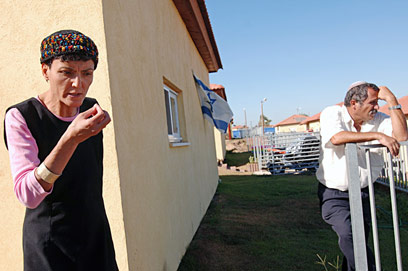
Dr. Kahane. 'They felt Nazi army was coming'
צילום: גיל יוחנן
Evacuee: I should have blown myself up in Gush Katif
Year after pullout from Gaza, evictees speak of their agony, familial problems, and teen delinquency
For many of the residents of Gush Katif and northern Samaria who were removed from their homes last summer, the displacement undermined the family unit that had once seemed so stable. Many families went through two types of disengagement, one involving removal from their homes and communities, the other involving their marriages. Dozens of couples instituted divorce proceedings, others separated, and many just haven’t been able to get along with each other or their children since then.
“There are always disagreements between members of a couple, but when you have to deal with a crisis, things become more intense,” says Dr. Baruch Kahane, a Gush Etzion psychologist who treats couples and individuals who went through the disengagement. “After the evacuation they found themselves without a community, and in many cases the only support available to them was their spouse. Here the natural limitations of each of them begin to play a role. If someone is quieter, or it’s harder for him to listen, or he has a tendency to move on and not to experience things, there can be very great emotional repercussions that would ultimately lead to a breakup of the family.”
What complaints do spouses have against each other?
“Women have complaints about their husbands, husbands against their wives, that they don’t talk or they don’t listen or that one of them feels that they should fight while the other one wants to lick his wounds a bit. Coping with a very difficult crisis can bring people closer or destroy the relationship.”
The psychologists with whom I spoke see evacuees who suffer from depression, fears, family disintegration. In addition, more than 50 percent (1,300 people) of the evacuees are unemployed, and hundreds are living in the “caravillas” in Nitzan. Nevertheless, some 80 percent of the evacuees have already received full compensation from the government.
“When a person is unemployed, stays at home, and doesn’t go to work in the morning, the pressure in the family pressure cooker increases,” says social worker Ronit Shoham, coordinator of welfare services for the evacuees. “The wife says, ‘go do something, find work, it doesn’t matter what kind.’ And if the man is 50 or older, he can’t find work, he becomes depressed, he is in crisis, and some of them don’t get out of bed. Their wives can’t accept this.”
Do the wives demand that their husbands leave the house?
“There are cases in which the husband decides that the pressure is not good for him, and he himself leaves the house. All in all, you can understand the men. A person who was accustomed to working his whole life and suddenly finds himself with nothing to do feels like a failure, with feelings of inferiority, depression. It isn’t pleasant for him vis-a-vis his wife and children that he is unable to make a living. So many times the best defense is to attack, or to escape. Everyone chooses his way of responding: one person becomes violent, another depressed, and another gets high blood pressure.”
At the caravilla site in Nitzan, Danny Demari, a father of three who is over 50 and unemployed, wakes up to a new morning. “In Gush Katif we would get up at four in the morning, go to the greenhouses, go to synagogue, and then again to the greenhouses, more synagogue, we’d return home at 3, 4, 5 p.m.,” he says. “Here we get up in the morning, go to synagogue, come back from synagogue, what do you do? What are you getting up for? What kind of day are you getting up for? For nothing. We have no reason to get up.”
Does the fact that you and your wife aren’t working affect relations at home?
“Things are very bad. The children have their own demands. They see other children with things that they want, but it isn’t possible because we aren’t working. Also, the children don’t listen any more to their parents. You tell them ‘no,’ and they don’t care. We went to a psychologist with the children, and we were told that things are not OK, that the evacuees are not in good shape. But what are they waiting for, a disaster?"

Demari family in Nitzan (Photo: Amir Cohen)
“We left Gush Katif honorably,” he says. “We left with head held high. We didn’t quarrel, we didn’t run amok. We were told that if we left respectfully we would get respect in return. We left, but what did we get? A knife in the back. And they’re still giving us the runaround. I’m sorry that I left Gush Katif the way I did. I should have put an explosive device on my body and when the soldiers arrived to evacuate me I should have blown myself up. I’m not the only one who feels that way; there are thousands of others like me. If I had known then that I was going to be in the state I’m in today, I would have done it.
“If I was supposed to do reserve duty today or to get drafted into the army, I would not agree to be drafted. My son is serving in the air force, and I told him the day of the disengagement, ‘go act like you’re crazy in the army, ask to be discharged from the army, you shouldn't agree to be drafted into an army like that, don’t serve this country.’ I said to my son, ‘You want me to tell you what to do? Wet your bed, smoke hashish so that they discharge you.’"
Demari’s disillusionment seems complete. “Today I have no flag, no country, no nationality, no national anthem, I don’t have anything. Tomorrow, if there were a siren signaling a moment of silence (for Israel’s war dead), I wouldn't stand up. As far as I’m concerned, let the country be destroyed, let it burn for all I care.”
Drugs, alcohol, and online sex sites
Dr. Kahane tries to understand the roots of this anger. “The mildness of their struggle against the disengagement created a situation in which the intensity of their anger was not expressed,” he says. ‘My home is my castle’ is something archetypical, it’s an instinct. Think how angry a person whose home is destroyed would be, but they haven’t gotten out their anger.
“The evacuees I’ve met have delusions. They can come in the form of a dream that the evacuation is taking place again, and now they do respond. Sort of like someone who’s been beaten, and has delusions that it’s happening again and this time he fights back, exactly on this level. In the fantasy they react, take the stick, and beat the soldiers who come to destroy their home.”
Professor Muli Lahad is an expert in coping with crises who has assisted SELA, the Disengagement Authority. "The loss of parental authority is perhaps the worst thing,” says Lahad. “Many parents have lost their authority because of the initial living conditions in the hotel (after disengagement), which allowed young people a lot more freedom than they’d been accustomed to in Gush Katif. This happened along with exposure to temptations that hadn’t existed in Gush Katif. And no less significant was the feeling that the older generation had disappointed them by not keeping their promise that the disengagement would not come to pass, which caused the young people to see their parents as impotent and incompetent and to take the law and action into their own hands.”
A report prepared by a committee of Gush Katif residents and the Land of Israel Legal Forum discusses “use of drugs and alcohol among young people who were evacuated, and surfing of sex sites.” It also mentions “suicidal thoughts and suicide attempts (some 12 of them), cutting of wrists and veins, eating disorders (some 10 cases), and psychiatric hospitalization (9 cases),” as well as “anger and disdain for rabbis and educators, along with a decline in level of religious observance.”

Sruggle in settlement of Homesh (Photo: Hagai Aharon)
If before the evacuation most of the settlers in Gush Katif were suspicious of psychotherapy, there seems to have been a major change in this attitude. In the past year 540 families and individuals have gone to the “Ma’anim” center, which, together with SELA, provides the evacuees with government-sponsored therapy for 12 sessions. If initially only the non-religious agreed to therapy, now the religious are beginning to seek therapy and even rabbis are asking for help for yeshiva students.
'They feel that the Nazi army is coming to get them'
Trauma, dreams, and nightmares come up at the therapy sessions. “My notebook is full of stories that haven’t yet been told,” says Ronit Shoham. “Did you know, for example, about the disgraceful fact that they took them on buses from Gush Katif for 30 hours until they brought them to the hotel, and they didn’t let them get off to go take a piss? Women wet their pants on the buses, and to this day they live with the nightmare.”
"Another trauma that people told me about one after the other,” says Kahane, "is that they felt as if the Nazi army were coming to take them. Large forces in black uniforms marched left and right in endless columns in Gush Katif in order to terrorize them, to break them and prevent them from resisting. Do you understand this feeling of terror? It’s really a feeling like the fascist marches. People said to me, ‘listen, it really was like the Nazi army was coming in.’ I heard this association many times, and I would advise you to take it as an emotional association, and not a political statement.”
Aren’t the evacuees partly responsible for their situation? They refused to leave for months. So why is the government responsible?
“You can’t blame the victim. I have no doubt that the government made every possible mistake, to put it mildly. They treated them patronizingly. After they destroyed their homes, they treated them like homeless people whom you have to raise like small children. This attitude itself caused trauma. Afterwards they had difficult experiences in the hotels which caused damage to the family unit, when the children were far from their parents’ room. Because of the hotel, families didn’t have a family meal together for many long months, and this is one of the most important institutions of the religious family. They put them in caravillas, and they were shuffled back and forth like lions in a cage.”
But there is another issue particular to the evacuees of Gush Katif: Whereas some families are splitting apart, others are coming together. A good many of the young people have decided, to their parents’ chagrin, to get married, even though they are still very young, some only 17 or 18. Maybe this youthful rebellion and the creation of a new family unit will go some way toward healing the trauma.










